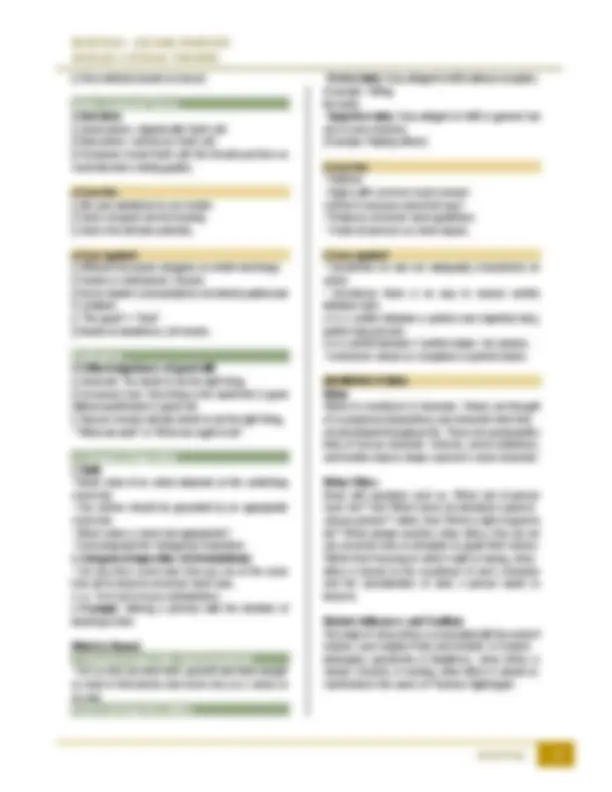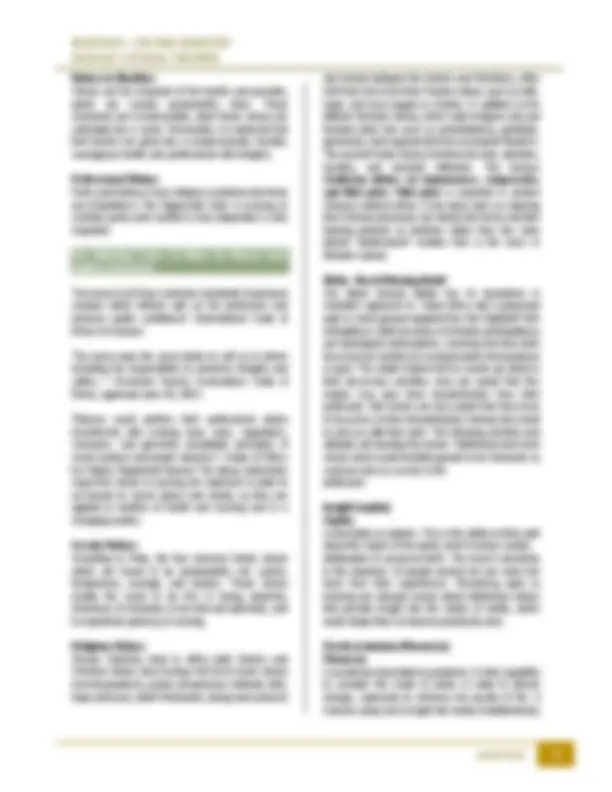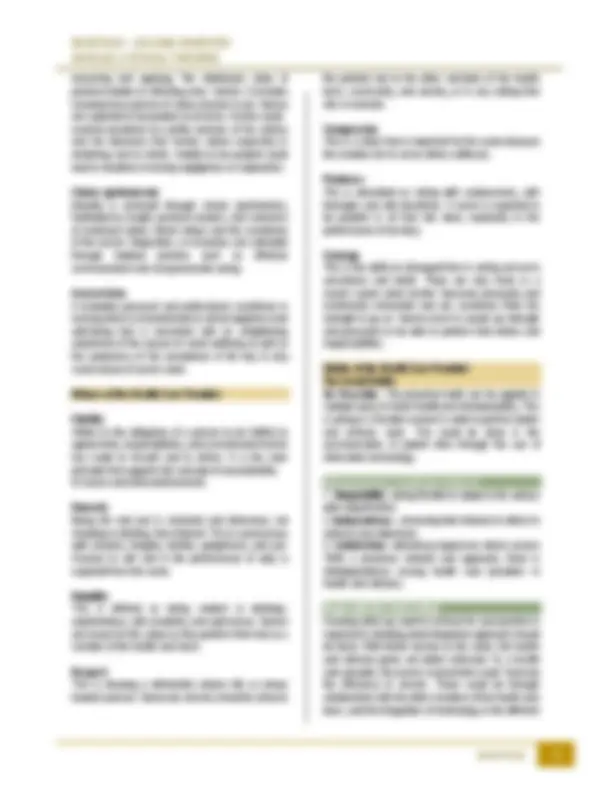





Study with the several resources on Docsity

Earn points by helping other students or get them with a premium plan


Prepare for your exams
Study with the several resources on Docsity

Earn points to download
Earn points by helping other students or get them with a premium plan
Community
Ask the community for help and clear up your study doubts
Discover the best universities in your country according to Docsity users
Free resources
Download our free guides on studying techniques, anxiety management strategies, and thesis advice from Docsity tutors
Various ethical theories, including Deontological, Virtue, and System Development Ethical Theories, that guide ethical decision-making in nursing. It also discusses relativism and divine command theory, as well as the importance of virtues in nursing. historical context and implications for codes of ethics.
What you will learn
Typology: Summaries
1 / 7

This page cannot be seen from the preview
Don't miss anything!




A human person act based on reason and will. With will, he chooses to do something that is determined by his reason that is ought to be done. With reason, he makes use of his mind and embark on seeking for knowledge. For nurses, we study the broad base of knowledge and use this knowledge as basis of our nursing actions. We try to aim for objective facts, tested and tried to be sound and effective to ensure correctness and safety of our nursing care plan. We justify and rationalize our judgments, decisions and actions based on this objective notion of what is good. By objective, we mean it is not based on feelings or personal motivations and instead a product of careful reflections and rigorous scientific evidence-based study. In ethics, there are ethical theories that guide us also in ethical decision-making. However, some of these theories oppose one another i.e. ethical egoism and virtue ethics etc, leaving the person unable to decide on which theory he can make use as anchor of any ethical decisions. As a teacher in ethics for several years and upon observing of the world and reality around me, I have come to the conclusion that some people choose a framework based on what suits his or her needs. Which in itself it truly subjective. However, Ethics must be objective, otherwise it fails to set a standard that will guide human character. Nevertheless, for purposes of scholarly study, we discuss the different ethical theories to have a wider perspective of the several ethical theories. A separate discussion will be dedicated to attempt a discussion on how to do ethical decision-making and how to determine the goodness and badness of a human act in simple terms. Summary of Ethical Theories
up some of their freedoms and accept the obligation to respect and safeguard the rights of others. The individual then gains a civil rights that constitute the social benefits that he is entitled to the extent he fulfills his due obligations towards society.
Virtues in Bioethics Virtues are the character of the health care provider, which are morally praiseworthy traits. These characters are immeasurable, when these virtues are cultivated into a nurse. Personality; it is believed that that he/she can grow into a compassionate, humble, courageous health care professional with integrity. Professional Virtues Purity and holiness have religious overtones but these are embodied in The Hippocratic Oath. In nursing, to maintain purity and manifest a holy disposition is also important. The following Codes of Ethics for Nurses have implied statements: The nurse at all times maintains standards of personal conduct which reflects well on the profession and enhance public confidence” (International Code of Ethics for Nurses) The nurse owes the same duties to self as to others including the responsibility to preserve integrity and safety…” (American Nurses Associations Code of Ethics, approved June 30, 2001) “[Nurses must] perform their professional duties inconformity with existing laws, rules, regulations, measures, and generally acceptable principles of moral conduct and proper decorum.” (Code of Ethics for Filipino Registered Nurses) The above statements imply that virtues in nursing are important in order to act based on social values and needs, as they are applied to realities of health and nursing care in a changing society. Secular Virtues According to Plato, the four classical Greek virtues which are found to be praiseworthy are: justice, temperance, courage, and wisdom. These virtues enable the nurse to be firm in facing adversity, intactness of character, to be kind and optimistic, and to experience great joy in serving. Religious Virtues Roman Catholics tend to affirm both Greeks and Christian virtues, thus having a full list of seven virtues (namely prudence, justice, temperance, fortitude, faith, hope and love); while Protestants, being more prone to see tension between the Greeks and Christians, often limit their list to the three Pauline virtues such as faith, hope, and love (agape or charity). In addition to the Biblical Christian virtues, other major religions also put forward virtue lists such as contentedness, gratitude, generosity, and magnanimity from among the Muslims. The ancient Hindu Caraka Samhita lists care, attention, humility, and constant reflection. The famous Confucian virtues are humaneness, compassion, and filial piety. Filial piety is important in ancient Chinese medical ethics. It has been seen as implying that Chinese physicians are ideally like family member treating patients as brothers rather than the more distant “professional” relation that is the norm in Western culture. Virtue- Based Nursing Model The Moral Ground Model has its foundation in Aristotle’s approach to ‟virtue ethics with a proposed path to moral ground adapted from the Eightfold Path of Buddhism. Both the ethics of Aristotle and Buddhism are teleological philosophies, meaning that they both focus human morality on moving toward a final purpose or goal. The model implies that as nurses go about in their day-to-day activities, they are aware that this routine may give them dissatisfaction from their profession. But nurses are also aware that they have to focus less on their dissatisfaction instead, they need to carry on with their work. The following activities and attitudes will develop the nurses ‟intellectual and moral virtues which could facilitate growth in her character as a person and as a nurse in the profession: Insight (sophia) Sophia is translated as wisdom. This is the ability to think well about the nature of the world, and it involves careful deliberation of universal truths. The nurse’s sensitivity to the situations ‟of people around her can make her learn from their experiences. Remaining open to learning can educate nurses about intellectual virtues that provide insight into the nature of reality, which could shape them to become practically wise. Practical wisdom (Phronesis) Phronesis is sometimes translated as prudence. It is the capability to consider the mode of action in order to deliver change, especially to enhance the quality of life. It involves using one’s insight into reality in deliberatively
reasoning and applying ‟the intellectual virtue of practical wisdom in directing ones ‟actions. It includes knowing how a person of virtue chooses to act. Nurses are expected to be prudent at all times. He/she could exercise prudence by careful analysis of the actions and the decisions that he/she makes especially in rendering care to clients. Inability to be prudent could lead to situations involving negligence or malpractice. Choice (prohairesis) Morality is achieved through choice (prohairesis), facilitated by insight, practical wisdom, and evenness of emotional states. Moral virtues and the excellence of the nurses ‟disposition, or character, are cultivated through habitual practice such as effective communication and compassionate caring. Goal or telos It embodies personal and professional excellence in nursing which is characterized as active happiness and well-being that is consistent with an enlightening awareness of the causes of moral suffering as well as the awareness of the sacredness of the day to day moral nature of nurse’s work. Virtues of the Health Care Provider Fidelity Refers to the obligation of a person to be faithful to agreements, responsibilities, and commitments that he has made to himself and to others. It is the main principle that supports the concept of accountability of nurses and other professionals. Honesty Being fair and just in character and behaviour, not cheating or stealing, free of deceit. This is synonymous with sincerity, integrity, truthful, uprightness, and just. Honesty to self and in the performance of duty is expected from the nurse. Humility This is defined as being modest in dealings, unpretentious, with simplicity, and submissive. Nurses are known for this virtue as they perform their role as a member of the health care team. Respect This is showing a deferential esteem felt or shown toward a person. Nurses do not only show this virtue to the patients but to the other members of the health team, community, and society, or in any setting that she is involved. Compassion This is a virtue that is important for the nurse because this enables her to serve others selflessly. Prudence This is described as acting with cautiousness, with foresight, and with discretion. A nurse is expected to be prudent in all that she does, especially in the performance of her duty. Courage This is the ability to disregard fear in acting out one’s convictions and belief. There are also times in a nurse’s career when he/she ‟becomes physically and emotionally exhausted and yet, somehow, finds the strength to go on. Nurses have to muster up strength and persevere to be able to perform their duties and responsibilities. Habits of the Health Care Provider The Good Habits Be Proactive - The proactive habit can be applied in multiple ways to foster healthcare interoperability. This is acting in a flexible manner in order to perform better and achieve more. This could be done in the communication of patient data through the use of information technology. Being proactive in healthcare results to: